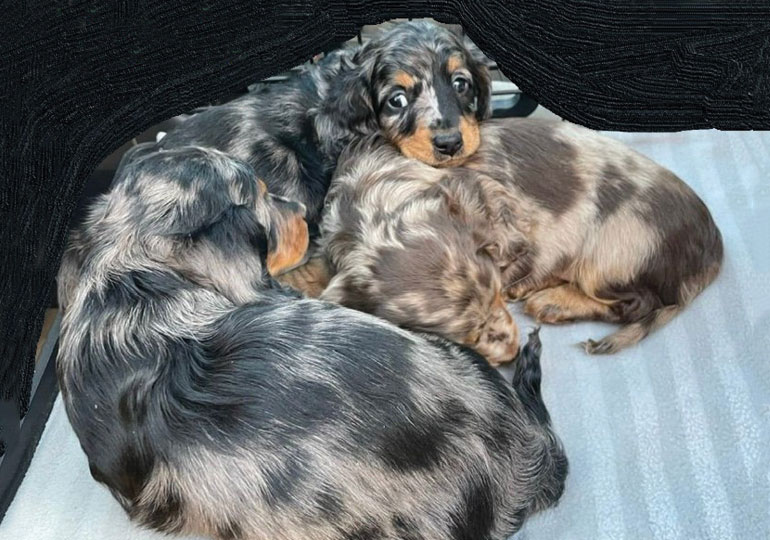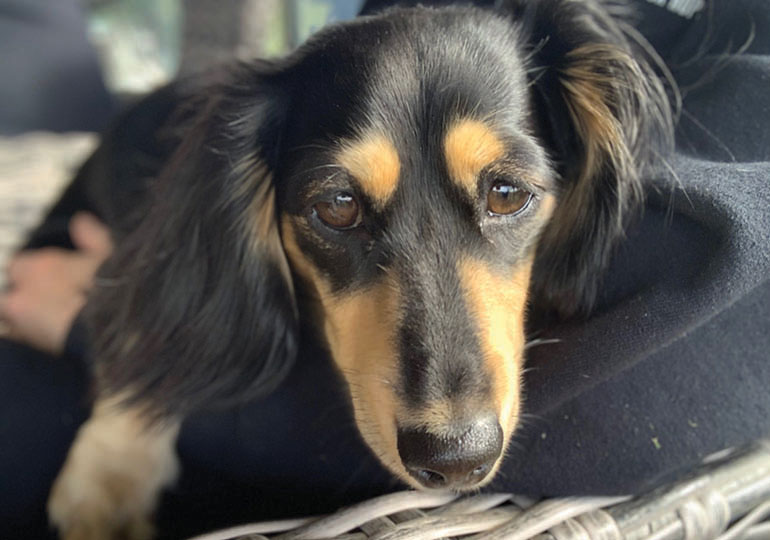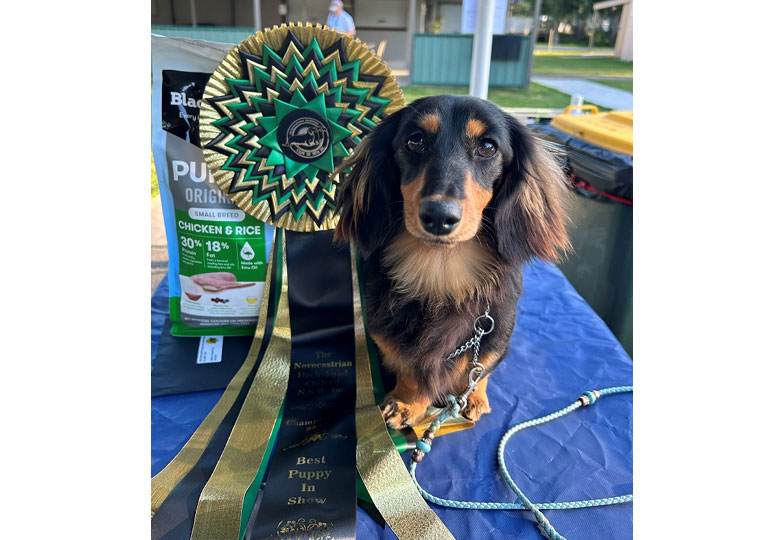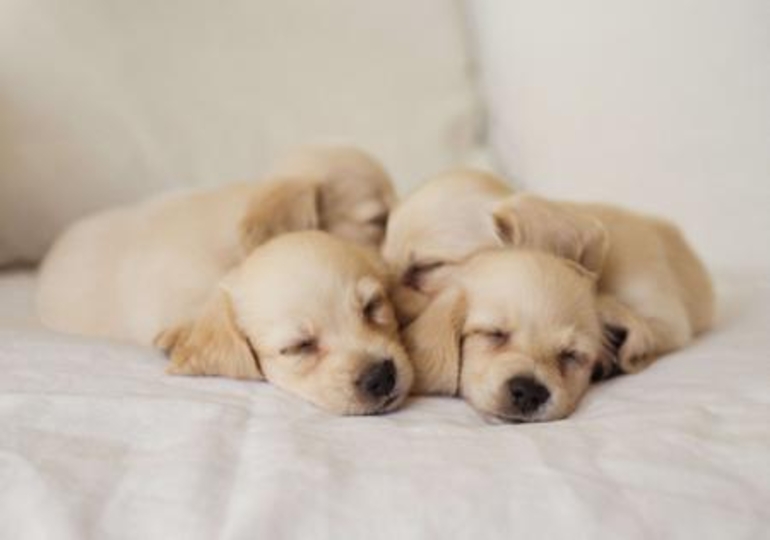Breeds
Dachshund Standard Long Haired & Miniature Long Haired
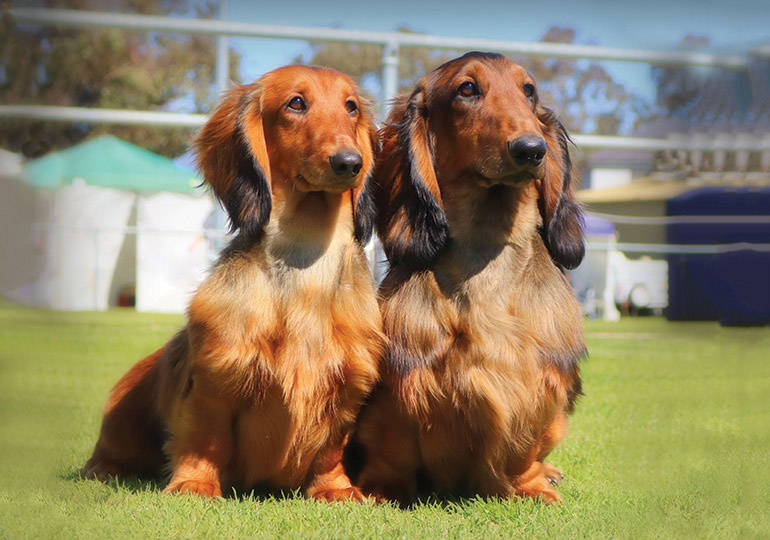
GROUP 4 - HOUNDS
History
Short legged, long bodied hounds of Dachshund type were recorded in carvings in Egyptian monuments as far back as the 15th century BC, and there is evidence that the English, as well as the Germans and Italians, had a similar hunting breed back in the 15th and 16th centuries. The breed was standardised in Germany where the dogs were used to enter badger dens, an exercise which required a short, powerful legs and a long body. Hunting per se is now frowned upon, but Dachshunds still retain the instinct and excel in Earthdog sports.
Most of the early dogs were bred with extremely crooked forelegs amounting, by present day standards, almost to a deformity. A German book on hunting published in 1719, however, does contain pictures of two dogs which very much resemble modern day Dachshunds and in 1879 the first German Stud Book was formulated listing the dogs and their breeders. Our show dogs today trace directly back to these. By the end of the 19th century the Germans were holding dog shows and hunting matches and Dachshunds were being developed in a greatly improved form. The Standard Dachshund back then was much smaller than the Standard size found in non-continental countries today and continues to be preferred, even to this day.
Dachshunds came to England around 1860, and prizes were first awarded at the Crystal Palace Dog Show in 1875. Both Queen Victoria and the Prince of Wales were keen Dachshund fanciers and this Royal patronage helped the breed tremendously. In 1877 the Kennel Club in England divided the Dachshund exhibited into groups, according to weight, and in 1878, another innovation occurred, division by colour. The breed was given its first real organisation when The Dachshund Club was formed and aided by Royal favour, the Dachshund had really arrived.
Miniature Dachshunds were introduced into England from Germany in 1938 and the Miniature Dachshund Club of England was formed in 1935. Early importations were in many cases unattractive; pop-eyed, short in ear and lacking in bone, but with the judicious use of small standards English breeders evolved the miniatures of today. Miniature Dachshunds are currently very popular as pets and make loyal companions.
Appearance
The breed is described as moderately long and low; compact with a well-muscled body; bold, defiant carriage of head and intelligent expression. In 2008 the Breed Standard to define the expected ratio of length to height, making it clear that adequate ground clearance is required to ensure dogs are fit for function.
Long-Haired - Soft and straight, or only slightly waved; longest under neck, on underparts of body and behind legs, where it forms abundant feathering, on tail where it forms a flag. Outside of ears well feathered. Coat flat, and not obscuring outline. Too much hair on feet undesirable. 1.
All colours permitted but no white permissible, save for a small patch on chest which is permitted but not desirable. The dapple pattern is expressed as lighter coloured areas contrasting with the darker base. Neither the light nor the dark colours should predominate. Double Dapple (where varying amounts of white occurs all over the body in addition to the dapple pattern) is unacceptable. 1.
Ideal weight: 9-12 kgs (20-26 lbs).
Miniature ideal weight; 4.5kgs (10lbs). Desired maximum weight 5kg
Temperament
Faithful, versatile and good tempered.
The following extract from “The Show Dachshund” by Robert Cole and Dr Sylvia Kershaw pp 7-9 summarise the temperament of the Dachshund. “The Dachshund has been described as the most likeable of dogs. They are particularly faithful and friendly and at the same time intelligent and teachable. In the house they are clean and well behaved and outside faithful, alert and reliable watch dogs.”
Dachshunds can be obstinate but once trained, excellent guard and house dogs, peaceable with their own variety and can be kept in groups.
Characteristics
Intelligent, lively, courageous to the point of rashness, obedient. Especially suited to going to ground because of low build, very strong forequarters and forelegs. Long, strong jaw, and immense power of bite and hold. Excellent nose, persevering hunter and tracker. Essential that functional build is retained to ensure working ability. 2.
Health
The breed generally suffers few health problems providing they are kept well exercised and fed a healthy, balanced diet. DNA testing for cord1 PRA has helped ensure there are very few cases of blindness from this genetic mutation. On average, they live to 12 years old and it is not unusual for them to live well beyond 15. As a dwarf breed, they have an increased risk of back problems (IVDD). Research by the RVC in 2013 suggested that exaggerated length and lack of height also contributed to an increased risk of IVDD.
We recommend that puppy buyers ask about any history of back problems and avoid buying puppies from parents with exaggerated length of body or excessively short legs. Lafora’s Disease has been identified in Miniature Wires and a DNA test developed. Breeders have responded and almost all Miniature Wires have been tested.
Suitability
Dachshunds are currently very popular as pets and make loyal companions.
Information in this article, compiled by Kathy Anderson, is based on “Dachshunds, Dachshunds, Dachshunds,” published in National Dog July 2002 edition and the Dachshund Club UK newsletters, published by Ian Seath.
Image supplied by Eric Soti.
In Conclusion
Now you know a little about the Dachshund Standard Long Haired and Miniature Long Haired, you may think that this is the dog for you. Before you make a decision, please make contact with the breed club or your State controlling body for purebred dogs. They will be able to give you information about available puppies and also suggest dog shows where you can see the breed and speak to breeders. In this way you will gain a better perspective of the Dachshund Long Haired and Miniature Long Haired and its needs and whether this breed and type would suit your lifestyle.
Breeders



